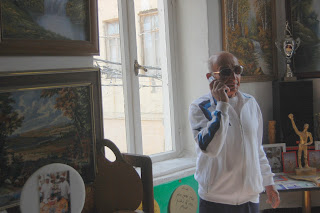Ghost apartments, ghost people
Levi Yitzhak is a company well known for producing hamechiron , a listing of prices which is the bible of the second hand car sector. A few years ago it moved into the flourishing real estate field. Recently, it estimated that about 10,000 "ghost apartments" scattered throughout Tel Aviv were left locked and shuttered for most of the year. Nearly all of them had between 2 and 3.5 rooms and sold for 2-3 million shekels ($500,000-$750,000). Had they been on the open market you could have rented them for NIS4,300 -NIS6,500 ($1,100 - $1,600).
But you can't rent them because their owners are foreign residents who need their holiday apartments to be available for the next weekend getaway or month-long holiday. And since they don't lack the money, they don't rent out their apartments. And since they don't rent out the apartments there are significantly less apartmnents for rent, which is turn raises the prices of the apartments that are available. The result is that the locals - especially the students and young couples who make Tel Aviv the vibrant city it is - are being frozen out of the city.
It turns out that the largest single group of buyers are French Jews who prefer the "old north" area , especially the streets leading to the sea like Gordon and Bograshov. The Americans prefer the "new north" , Ramat Aviv and Kochav Hatzafon. But overall, the most popular areas for foreign home buyers is Rehov Hayarkon (on the seafront), Sderot Rothschild (smart and swanky) and Neve Tzedek (romantic - the home of the Rooftop). The wonderful but neglected old buildings in these areas have been restored and wherever the developers find that they can buy up and demolish entire blocks, they are building gleaming residential towers on them. But how many of these are left empty for most of the year, emptying out the city centre instead of filling it?
Another group of people changing Tel Aviv's demographics are the migrant workers and asylum seekers from Africa that are streaming into Israel across its long border with Egypt. Many of them find their way to south Tel Aviv and are doing menial jobs across the city. The large numbers of immigrants concentrated in the poor neighbourhoods of the south have set off a racist backlash fanned by rightist Knesset members.
An African immigrant collecting bottles for the deposit in Florentin
Tel Aviv wants to be recognised as a 'global city' and the muncipality has even opened a new department to promote the campaign. Global city or not it is certainly being buffetted by the forces of globalisation that are transforming the human landscape before our very eyes. Constant change though is in Tel Aviv's genes.






Comments